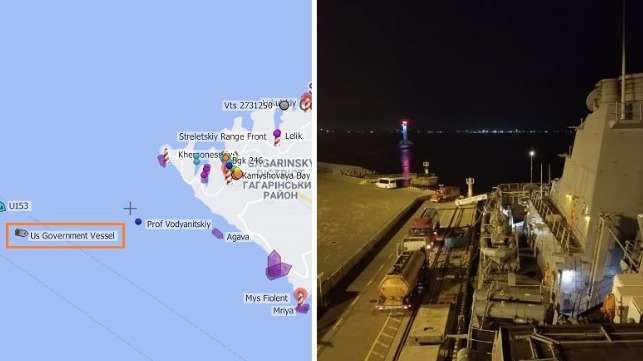Who "Moved" the Position of a U.S. Navy Ship From Odessa to Crimea?

In June, a UK Royal Navy destroyer and Dutch Royal Navy ship safely moored in Odessa, Ukraine, were spoofed to locations off-shore of a Russian naval base on Crimea.
One week later, it was a US Navy ship moored in the same port that was spoofed (above).
These are interesting cases in several ways.
First, how was it done?
- No other vessels seem to have been impacted, so this is much different from the wide-area spoofing the Russians have long conducted in the area.
- It could have been highly targeted GPS spoofing that only impacted the three ships. But the three ships were in port alongside a pier. Did they even have their GPS and AIS activated?
- It could be that typical GPS spoofing had nothing to do with it and it was just AIS signals that were imitated and detected by satellites.
- It is possible that the AIS equipment aboard the three ships was programmed by the ships’ crews to transmit the false information.
Second, who did it?
- The Russians are clearly capable of doing this. They have regularly spoofed large numbers of vessels in the Black Sea over the last five years. This was a bit different as only one or two vessels were impacted, but it is not much of an additional challenge.
- The NATO (UK, Dutch, US) crews could have done it. They certainly had access to the equipment and the ability to do it.
- It could have been a third party. Perhaps a bit more of a challenge, but not a particularly heavy lift for a reasonably competent RF hacker.
Third, why was it done?
- If it was the Russians, it was likely yet another demonstration of their impressive electronic warfare capability and a chance to show dominance over the West
- It it was the NATO ship crews, perhaps it was a way of nettling the Russians without the trouble of having to actually sail by. It could also have been an attempt to confuse them with a feint. The UK ship, HMS Defender, actually sailed somewhat close to the spoofed route several days later and was harassed by Russian forces.
- If it was a third party, perhaps it was just to cause confusion, hate, and discontent. In the 1997 James Bond film “Tomorrow Never Dies,” the super-villian spoofs a Royal Navy ship into Chinese waters to provoke an armed conflict (see clip below).

that matters most
Get the latest maritime news delivered to your inbox daily.
Fair use / CMSI
This article appears courtesy of the Resilient Navigation and Timing Foundation, and it may be found in its original form here.
The opinions expressed herein are the author's and not necessarily those of The Maritime Executive.
